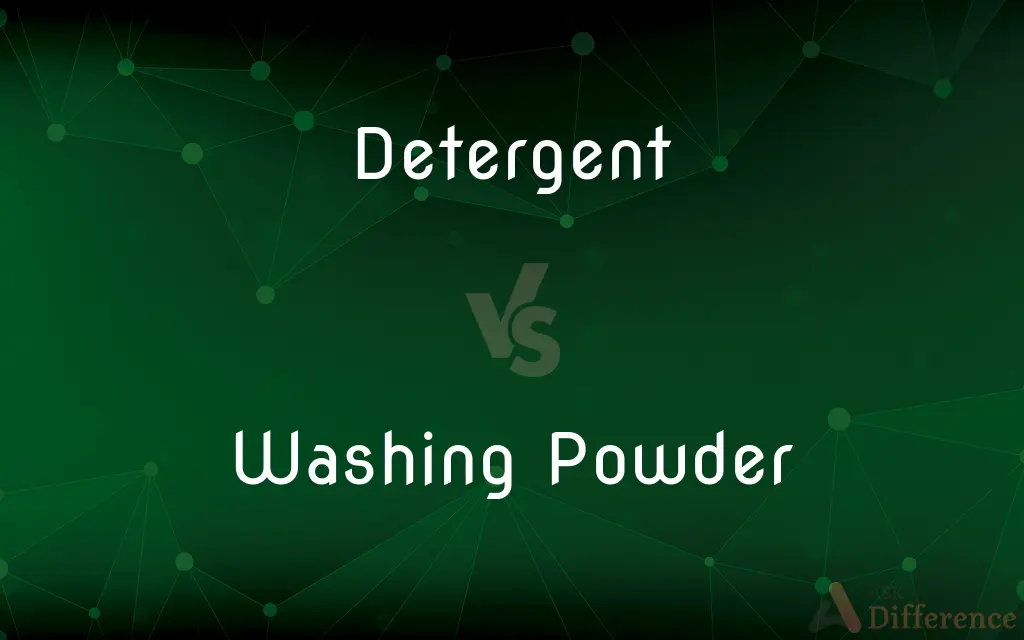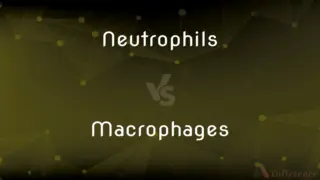Detergent vs. Washing Powder — What's the Difference?
By Tayyaba Rehman — Published on October 19, 2023
Detergent, available in liquid or powder form, is a cleaning agent for removing dirt from a variety of materials, while Washing Powder, specifically a type of detergent, comes in powder form and is commonly used for laundering.

Difference Between Detergent and Washing Powder
Table of Contents
ADVERTISEMENT
Key Differences
Detergent, ubiquitously recognized for its cleaning capabilities, encompasses various formats such as liquids, powders, and pods, offering versatility in its application across different washing needs. On the other hand, Washing Powder specifically refers to the powdered form of detergent, which is often praised for its storage longevity and economic viability.
While Detergent in its liquid form provides ease of pre-treating stains, due to its ability to target soiled areas directly, Washing Powder is typically revered for its ability to provide cleaner washes in hard water, owing to its particular formulation and composition.
Detergent often becomes a preferred choice for cold water washing due to its ability to dissolve quickly and efficiently at lower temperatures. Conversely, Washing Powder, with its granular form, may require warmer temperatures to dissolve effectively and deliver optimal cleaning results.
A notable point of divergence between Detergent and Washing Powder lies in their environmental implications: liquid detergents tend to be sealed in plastic containers, raising concerns regarding plastic usage, whereas washing powders can be purchased in cardboard boxes, presenting a slightly eco-friendlier option.
Both Detergent and Washing Powder serve as effective cleaning agents, but individual preferences may steer one towards a specific type. While some may prioritize the easy pour and pre-treat capabilities of liquid detergent, others might lean towards the economical and classic washing powder for their laundry needs.
ADVERTISEMENT
Detergent represents a broad category of substances crafted to cleanse and remove impurities from materials such as fabric, dishes, and surfaces. On the other hand, Washing Powder specifically pertains to powdered forms of detergent, especially devised for washing clothes.
Detergents can take on various forms, such as liquids, powders, pods, or bars, each serving a particular cleansing purpose. Washing Powder, being a subset of detergents, primarily sticks to one form - a powder - and is predominantly utilized in laundering practices.
Detergent, encompassing a diverse array of cleaning agents, can cater to an expansive range of cleaning needs, from dishes and cars to floors and clothes. Washing Powder is generally optimized for laundry use, facilitating the removal of stains and dirt from fabrics.
The formulation of Detergent can include a myriad of ingredients, potentially being either chemical or natural, and tailored for general or specific cleaning requirements. Washing Powder’s formulation is predominantly designed to address the various challenges present in fabric cleaning.
Detergent may feature various scents, additives, or specialized components to tackle different cleaning obstacles, offering a broad selection for varied purposes. In contrast, Washing Powder maintains a focus on attributes that enhance the efficacy of clothes washing, such as stain removal and fabric care.
Comparison Chart
Form
Available in liquid, powder, or pod.
Specifically in powdered form.
Use in Different Waters
Effective in various water types.
Especially effective in hard water.
Temperature Suitability
Often suitable for cold washes.
May require warmer water to dissolve fully.
Packaging
Often comes in plastic containers.
Frequently available in cardboard boxes.
Pre-treating Stains
Can target stains when in liquid form.
Not ideal for direct stain treatment.
Form Variety
Detergent can be liquid, powder, or pods.
Washing Powder is specifically in powder form.
Usage Scope
Detergent serves diverse cleaning purposes.
Washing Powder is predominantly for laundering.
Inclusion Range
Detergent includes all types of cleaning agents.
Washing Powder is a subset of detergents.
Formulation Flexibility
Detergent can have varied formulations.
Washing Powder focuses on fabric cleaning.
Application Spectrum
Detergent can clean various materials.
Washing Powder mainly cleans fabrics.
Compare with Definitions
Detergent
A cleaning agent that might include bleaching agents or enzymes.
The detergent was effective in removing the stubborn stains.
Washing Powder
A granulated substance used for laundry.
Washing powder is often used for bulk laundering.
Detergent
Detergent is a substance used for cleaning.
Detergent can effectively remove grease from dishes.
Washing Powder
A dry detergent often used in residential laundry.
Washing powder has been traditionally used for decades.
Detergent
It comes in various forms including liquid and powder.
Liquid detergent is often used for washing cars.
Washing Powder
A cleaning agent in powdered consistency.
She chose washing powder for its lasting shelf-life.
Detergent
A cleaning substance in varied forms.
She used a liquid detergent for the delicate fabrics.
Washing Powder
Washing Powder is a powdered form of detergent.
Washing Powder often comes in a box or pouch.
Detergent
A substance available in several formulations for washing.
He bought a detergent that can be used for both colors and whites.
Washing Powder
Washing Powder may contain bleach or whiteners.
This washing powder contains bleach for whiter whites.
Detergent
A versatile washing assistant in different formats.
She prefers using pod detergents for convenience.
Washing Powder
A detergent variant that is often economically priced.
She bought washing powder because it was on sale.
Detergent
Detergent can be formulated for specific cleaning tasks.
This detergent is specially formulated for removing tough stains.
Washing Powder
Washing Powder can have specific fragrances.
The washing powder left a fresh rose scent on the linens.
Detergent
It is used on various materials such as fabric and metal.
Detergent is versatile enough to clean both clothes and utensils.
Washing Powder
A powdered form of detergent.
He added washing powder to the machine.
Detergent
A cleansing substance that acts similarly to soap but is made from chemical compounds rather than fats and lye.
Washing Powder
It is predominantly used in laundry applications.
Use washing powder in the washing machine for clean laundry.
Detergent
Having cleansing power.
Washing Powder
It is specifically designed for cleaning fabrics.
Washing Powder helps in lifting stains from clothes.
Detergent
Any non-soap cleaning agent, especially a synthetic surfactant.
Detergent
Syn of cleansing.
Detergent
Cleansing; purging.
Detergent
A surface-active chemical widely used in industry and laundering
Detergent
A cleansing agent that differs from soap but can also emulsify oils and hold dirt in suspension
Detergent
Having cleansing power
Detergent
An agent aiding in the removal of dirt and stains.
Detergent usage can vary depending on laundry type and soiling.
Detergent
Detergent can contain different scents and additives.
The lavender scent of this detergent is quite refreshing.
Common Curiosities
What is detergent?
Detergent is a cleaning agent available in varied formats like liquid, powder, and pods.
What is washing powder?
Washing powder is a type of detergent specifically in powdered form.
Can detergent and washing powder be used interchangeably?
Yes, but adjustments may be needed based on washing conditions and requirements.
Is washing powder more economical than liquid detergent?
Often, yes. Washing powder tends to be less expensive and lasts longer per package.
How much washing powder should be used per load?
Follow the recommended usage on the package, as it varies by brand and machine type.
Can detergent be used for hand-washing garments?
Yes, especially liquid detergent, as it dissolves well in water for hand-washing.
Can all detergents be used for all types of laundry?
No, some detergents are formulated for specific laundry types, like delicates or darks.
How is washing powder packaged?
Washing powder is commonly packaged in cardboard boxes, though plastic tubs are also used.
Why does washing powder not dissolve well in cold water?
The granules in washing powder may require more agitation or heat to dissolve completely.
Is liquid detergent better for pre-treating stains?
Generally, yes. Liquid detergent can be applied directly to stains for pre-treatment.
Is detergent available in eco-friendly formulations?
Yes, there are detergents formulated to be eco-friendly and have reduced environmental impact.
Can I use washing powder for all fabric types?
Generally, yes, but always read labels for any specific instructions or warnings.
Do I need to use a separate fabric softener with detergent?
Depending on preference, a separate fabric softener can be used with detergent for added softness.
Can washing powder lose its effectiveness over time?
Yes, washing powder can clump and lose efficacy if stored improperly or kept for a very long time.
Are detergents safe for sensitive skin?
There are detergents specifically formulated for sensitive skin, always opt for those if skin irritation is a concern.
Share Your Discovery

Previous Comparison
Neutrophils vs. Macrophages
Next Comparison
Disapproval vs. CriticismAuthor Spotlight
Written by
Tayyaba RehmanTayyaba Rehman is a distinguished writer, currently serving as a primary contributor to askdifference.com. As a researcher in semantics and etymology, Tayyaba's passion for the complexity of languages and their distinctions has found a perfect home on the platform. Tayyaba delves into the intricacies of language, distinguishing between commonly confused words and phrases, thereby providing clarity for readers worldwide.











































